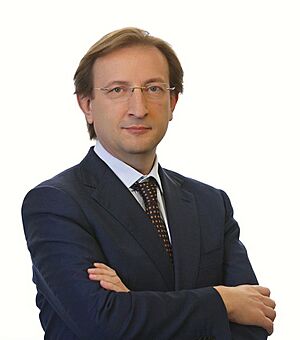Carlos Simon (gynaecologist) facts for kids
Carlos Simón Vallés was born in Buñol, a town in the Valencian Community in Spain, in 1961. He is a Spanish doctor who does a lot of research. He specializes in obstetrics and gynecology, which means he helps women with pregnancy and their reproductive health. He is a professor at the University of Valencia and also teaches at Harvard University. He is known worldwide for his work in assisted reproduction, which helps couples have babies.
Contents
Biography of a Medical Expert
Early Life and Education
Carlos Simón Vallés studied Medicine and Surgery at the University of Valencia. He graduated in 1985 with top honors. He then continued his studies, earning his doctorate in Medicine and Surgery in 1986. His doctoral research looked at cells from pregnancy to help diagnose problems early.
After his doctorate, he became a specialist in Obstetrics and Gynecology. He completed his training at the Hospital Clínico Universitario de Valencia from 1987 to 1990. He worked there as a doctor until 1991.
Research and Teaching Career
Dr. Simón then moved to Stanford University in California, USA. There, he did advanced research in reproductive endocrinology from 1991 to 1994. This is a field that studies hormones related to reproduction. After this, he focused his career on medical research. He worked on reproductive medicine and regenerative medicine.
He is a professor at Stanford University and Baylor College of Medicine in Texas. He has also been a visiting professor at other famous universities. These include Yale University, the University of Hong Kong, and the University of Adelaide.
Pioneering Work in Stem Cells
Dr. Simón was a pioneer in Spain for his work with stem cells. Stem cells are special cells that can develop into many different cell types. Because of his important work, he became the director of the Valencia Node of the National Stem Cell Bank. This bank is located at the Centro de Investigación Príncipe Felipe (CIPF). He also coordinated the Regenerative Medicine area and was the scientific director of the CIPF.
Innovations and Foundations
Dr. Simón has invented fifteen active patents. These are special rights that protect his new ideas and inventions. These patents led to the creation of a biotechnology company called Igenomix S.L. This company has laboratories in many cities around the world. These include Valencia, Sao Paulo, Delhi, Los Angeles, and Dubai.
He is also the founder and co-president of the Carlos Simón Foundation. This foundation supports research in women's health. He has four children.
Awards and Recognitions
Carlos Simón Vallés has received many important awards for his work:
- King Jaime I Award for Medical Research (2011): He received this award for his groundbreaking study. This study looked at problems with the human endometrium. The endometrium is the lining of the uterus. Problems with it can cause infertility, which means difficulty having a baby.
- Favorite Son of Buñol (2011): This is an honor from his hometown.
- Distinguished Researcher Award (2016): This award recognized his long research career. It also honored his new and important contributions to reproductive medicine.
- Lilly Foundation Biomedical Research Award (2021): He won this award for his pioneering work. This work focused on studying the human endometrium and how it works.
Important Groups and Associations
Dr. Simón is a member of several important medical and scientific groups:
- He is a member of the Royal Academy of Medicine of the Valencian Community.
- He is on the Strategic Advisory Board of the Department of Development and Regeneration. This is at the Catholic University of Leuven in Belgium.
- He advises the World Health Organization (WHO). He has been a scientific consultant for their Human Reproduction Programme since 1998.
- He represents Spain in the International Society for Stem Cell Research (ISSCR).
Scientific Discoveries and Contributions
Since 1991, Dr. Simón has made many important discoveries. His research has helped solve problems related to infertility. Infertility affects about 10% of couples worldwide.
Understanding Infertility
He has shown how high levels of a hormone called estradiol can be harmful. This hormone is important for reproduction. His work has changed how doctors use this hormone in treatments. He also helped create the idea of "mild stimulation" in fertility treatments.
Using advanced technology, he identified genes involved in how the uterus lining (endometrium) receives an embryo. This is called endometrial receptivity. He has published many papers on his findings. One of his first papers is among the most cited in a major scientific journal.
New Diagnostic Tools
His research led to a patent for a special test. This test is called a customized endometrial receptivity array (ERA). It helps doctors diagnose problems with endometrial receptivity in patients who have trouble getting pregnant. He also created a free online database about endometrial receptivity. This database is managed by the University of Valencia.
Discovering Endometrial Stem Cells
Thanks to special funding, he investigated where human endometrial stem cells come from. He discovered these special stem cells. When isolated, these cells can rebuild the human endometrium. This is a huge step forward in regenerative medicine.
Human Embryology and Stem Cell Lines
Since 2001, his work in human embryology has grown. He has researched pluripotent stem cells. These are cells that can turn into almost any cell type in the body. He was a pioneer in Spain. He was the first to create human embryonic stem cell lines in the country. He has helped derive, study, and register 10 human embryonic stem cell lines in the National Cell Line Bank. His work has also shown that some widely used cell lines around the world lack genetic diversity.
Images for kids
See also
 In Spanish: Carlos Simón para niños
In Spanish: Carlos Simón para niños
 | William M. Jackson |
 | Juan E. Gilbert |
 | Neil deGrasse Tyson |



